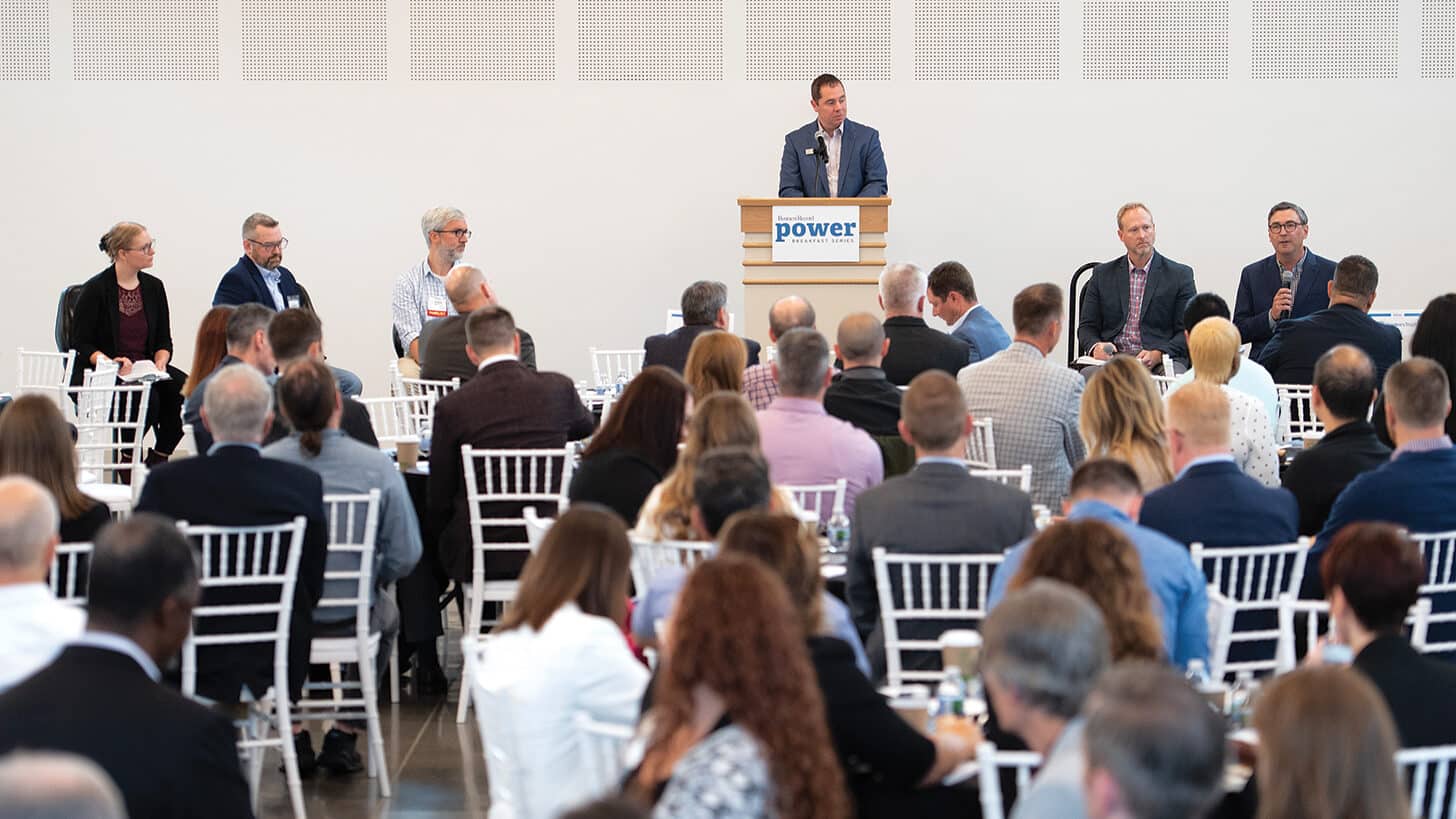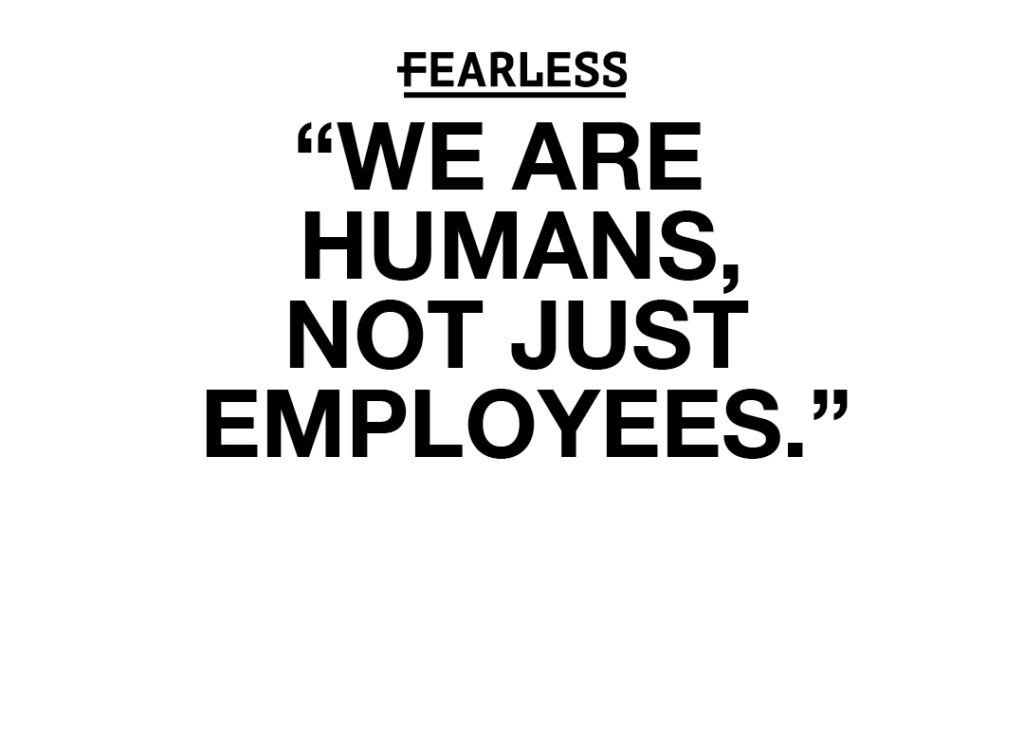Nine takeaways from our Power Breakfast on AI
Panelists discussed potential broader effects on business and workforce

Business Record Staff Nov 24, 2023 | 6:00 am
<1 min read time
0 wordsBusiness Record Insider, Innovation and Entrepreneurship
The Business Record recently hosted its third and final Power Breakfast of 2023 on the topic of artificial intelligence. The panel helped provide business leaders with practical insights so they can determine what AI means for their organizations and how they may need to adapt as the technology evolves in the future.
Here’s what our reporters took away from the conversation.
White-collar professionals uncomfortable with automation that has existed in blue-collar work for years
Riesberg said blue-collar automation has been happening forever but those in white-collar professions are uncomfortable with the idea of automating areas of their jobs. “You think about manufacturing and the ag space. I think we’re all a little sensitive when it’s a white-collar job. When you automate a person’s role, you get all those emotions, those feelings, and you have to tell someone that their job is going to be different. It’s not replacing jobs. It will just force you to do your jobs differently. If you were good with Excel, good with PowerPoint, you could exceed. You could continue to grow your career. Those skillsets are changing. If you’re good at using AI-based tools, I think you now have a competency that allows you to do your job differently, faster, better than others.”
— Michael Crumb
With intelligence comes bias
Gifford said as companies begin using AI, they will have to encounter the inherent biases that come with intelligence. “You get into this philosophical debate,” he said. “What’s interesting is with intelligence, there’s bias. There are negative aspects to intelligence. What we’re trying to do now is we’re starting to have these conversations about how do we codify these? And those will exist forever. As long as there’s intelligence, there will be biases, so what I’m hoping is there is enough variety and competition that market forces will help create good tools. I think the good will outpower the evil.”
— Michael Crumb
AI can help address workforce challenges
Waller said AI is not going to take away jobs, but can help perform tasks in positions where there are openings. “Think of software engineers. We need so many software engineers in Iowa, and AI can help with that. So I see a positive there. AI is going to help with productivity in our state and with our organizations. The challenge to me is workforce. The solution may be artificial intelligence.”
— Michael Crumb
Who’s ahead in the race to regulate AI?
Riesberg said that while EMC is embracing AI technology and using it to make its enterprise data more accessible for its workers, company leadership “inherently understands the risks” involved with data protection related to AI and has a risk-management team for the technology. Riesberg said EMC would also appreciate a governing body to regulate AI use. According to Waller, AI is likely to come up in the Technology Association of Iowa’s advocacy at the Iowa Legislature during the 2024 session after being the fourth state in the U.S. to pass a cyber defense bill and the sixth to pass a data privacy law last session. The federal government, Waller said, is further behind in monitoring the security risks with AI technology and does not have a uniform data privacy law, unlike the European Union. “I fear that the Europeans and other countries are a little farther ahead of us, not in the advancement of AI, but in the regulation of AI,” Waller said.
— Mike Mendenhall
Protecting intellectual property, dropping AI ‘shame’
Gifford said leaders for companies that want to incorporate AI tools to access their own internal data and intellectual property should use “isolated models” and “not just give it to another model to use for training.” Many cloud vendors already offer these protected AI applications, he said, and leaders will need to decide what problems the tools can solve in their companies. Gifford said employers and workers will need to drop the stigma associated with using AI to allow the tools to reach their potential in the workplace. “There seems to be this human aspect of shame associated with using some of these tools, and everybody prefaces, if they use [AI], like ‘Oh, I had ChatGPT create it,’ like it’s kind of a joke. They’re using it but they don’t want to tell a lot of people publicly that they’re using it. Although, generally, it makes them better.” Gifford said, eventually, everyone will likely have “personal coaches,” AI tools that can answer complex questions daily and it will “feel natural.”
— Mike Mendenhall
AI developers working to block access to ‘harmful content,’ beat jailbreaks
Porter said a pitfall of some current AI models is the possibility the program will incorporate “harmful content” from the internet into its learning and propagate that data into the words and answers provided to users. He said AI firms are working to block access to harmful or bad content, but users have found ways around those safeguards, called “jailbreaks.” Porter said AI tools will need to be trained to filter out that information, as well as social biases in its answers. “If it was trained on harmful content, that it’s latent within the model. And companies like Open AI and Anthropic … they are concerned with users accessing that. So there are different techniques for blocking access to that,” Porter said.
— Mike Mendenhall
Drake’s AI major teaches students how to be more adaptive
Drake University offers an artificial intelligence major, which is an interdisciplinary program in the College of Arts and Sciences that includes courses from computer science and math, arts and humanities, and business and law. Porter said this was designed for students to be adaptive and aware of how AI overlaps with many different disciplines. Courses in the program range from computer science to philosophy of AI to digital ethics and legal foundations of AI. “As students embody that fluidity, ‘Wait, I’m going from a neuroscience class to a literature class, thinking about the same things, but then from a different point of view … and be very universal,” Porter said. “That was the model that we went for, and we’re now seeing that the students are more adaptive.”
— Kyle Heim
AI presenting challenge of determining who owns what
More than a dozen authors sued OpenAI for “systematic theft on a mass scale” in September, concerned that artificial intelligence programs have been using their copyrighted works without permission, according to the Associated Press. Porter said this is creating a challenge over who owns what. “OpenAI’s terms of service say you own the output, but if you ask ChatGPT what color the sky is and they say, “The sky is blue,” you don’t own “The sky is blue,” he said.
— Kyle Heim
What could be next for AI innovation?
One reality of AI is its uses and effects that last long-term are yet to be determined. Porter said that among the possibilities is the fact that AI could help humans see problems they wouldn’t have before. “If we’re using AI to augment our own intelligence, what kind of problems can be solved that maybe we never thought would be even within our reach? I think there’s a lot of space to imagine new possibilities, where now we’re doing new things, we’re hitting new marks at levels that are qualitatively different and not just quantitatively different,” Porter said. Another question for the near future is will AI innovation plateau or speed up following the acceleration of large language models? According to the Gartner hype cycle methodology, the next stage after a technology reaches a landmark innovation is the “trough of despair,” where the innovation may stagnate or slow down. “I do think the trough is going to be less and the innovation is going to happen faster just because of the intelligence. More intelligence is going to be better for our species and our society,” Gifford said. Riesberg offered a contrasting prediction, saying he believes as one of the four “groundbreaking technologies” of his career, along with the internet, mobile and cloud, AI innovation is going to continue accelerating and bring change across the board.
— Sarah Diehn









